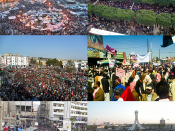10, Riehl
Owen Marshall
For the first time since 1987, Tunisians today do not have to worry about being ruled by dictator Ben Ali. Ali was a repressive leader who severely curtailed freedom of speech and exploited the poor economically. After 23 years of Ben Ali's power, the Tunisian people revolted and ousted their repressive leader in 2011. Since that revolt, however, Tunisia is still seeking a fair, democratic government. It is widely understood that it will take a series of steps before achieving the democratic Tunisia their people demand. Yet they are thrilled to know that they have overcome the most challenging step of overthrowing Ben Ali. The Tunisian revolution was successful because the overthrowing of Ben Ali ended many years of exploitation of working class Tunisians, who make up a majority of the population. The revolution did not come out of nowhere; there were many causes, short and long term, that motivated the Tunisian protesters.
There were two significant short term causes that sparked the revolution: a street vendor named Mohamed Bouazizi set himself on fire in Sidi Bouzid, after being humiliated publicly by the government. And the usage of social media technology, including Twitter, Facebook, and Wikileaks helped people communicate and verify information. These precipitating events stimulated many of the protests and marches which resulted in the revolt, on January 14th, 2011, just a month after Bouazizi's death. In terms of long term causes, the repression of the Tunisian people under Ben Ali were like sticks rubbing together, and the short term causes were the sparks.
There are two short term causes that ignited the Tunisian revolution; firstly, when a street vendor took his own life on a street in the central Tunisian city, Sidi Bouzid. And secondly, social networking, as well...


